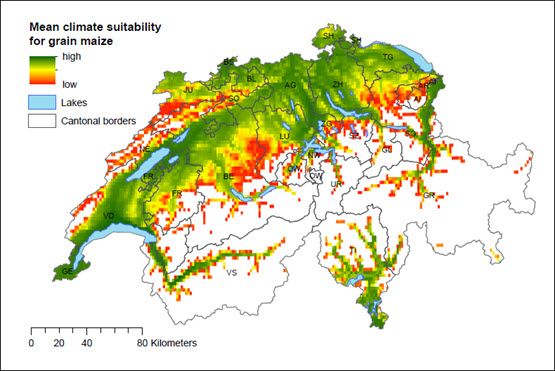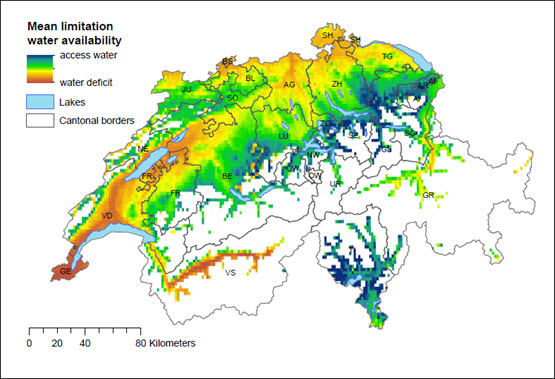Agricultural crop production is highly dependent on climatic conditions. As a result of climate change, temperatures are rising, precipitation patterns are changing and the frequency of extreme events (e.g. droughts and heat waves) is expected to increase in the future. In order to make the most of the scope of possible uses for plant production in Switzerland today and in the future, it is important to estimate the direct and indirect effects of climate change on crops. Based on knowledge about expected risks, suitable measures for climate adaptation can be planned and taken (e.g. changes in crop/variety selection, irrigation, determination of breeding targets).


Based on a climate suitability evaluation, climate potentials and limitations for maize and winter wheat in Switzerland are quantified. It can thus be shown, which factors limit the yield potential most under current conditions in a particular region and which limitations become more important with climate changes (e.g. heat, drought stress).
Results based on this method show that the productivity of winter wheat under current climate conditions is most severely limited by waterlogging, frost, heat and insufficient radiation. With rising temperatures, an increase in heat stress limitations must be expected in the long run, although early flowering at warmer temperatures reduces heat stress exposure for winter wheat. This avoidance effect ("phenological heat escape") means that heat stress exposure will not increase significantly by the middle of the century compared to today. Beyond that, however, an increase in heat stress will have to be expected if no effective climate protection measures are implemented (emission scenario RCP 8.5).
For grain maize, temperature, radiation and drought limitations are the main limiting factors under current climate conditions. This suggests that maize cultivation in Switzerland can benefit from rising temperatures at least in the medium term. In addition to the approximation of optimal growth temperatures, the acceleration of phenological development also plays a role: by shifting the sensitive flowering period to an earlier period of the year, negative effects of drought and heat stress can be reduced in grain maize as well. However, a shortening of the grain filling phase due to an accelerated phenological development can lead to a yield reduction. If later maturing varieties were planted to compensate for this effect, this would have implications on the crop water requirements. Irrigation water requirements could thus increase disproportionately under climate change - considering that warmer temperatures extend the period of the year suitable for cultivation.
Publications
Contact





